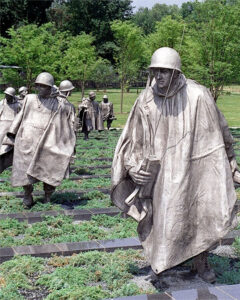
Edward Krzyzowski
Capt. Krzyzowski, distinguished himself by conspicuous gallantry and indomitable courage above and beyond the call of duty in action against the enemy as commanding officer of Company B. Spearheading an assault against strongly defended Hill 700, his company came under vicious crossfire and grenade attack from enemy bunkers. Creeping up the fire-swept hill, he personally eliminated one bunker with his grenades and wiped out a second with carbine fire. Forced to retire to more tenable positions for the night, the company, led by Capt. Krzyzowski, resumed the attack the following day, gaining several hundred yards and inflicting numerous casualties. Overwhelmed by the numerically superior hostile force, he ordered his men to evacuate the wounded and move back. Providing protective fire for their safe withdrawal, he was wounded again by grenade fragments, but refused evacuation and continued to direct the defense. On 3 September, he led his valiant unit in another assault which overran several hostile positions, but again the company was pinned down by murderous fire. Courageously advancing alone to an open knoll to plot mortar concentrations against the hill, he was killed instantly by an enemy sniper’s fire. Capt. Krzyzowski’s consummate fortitude, heroic leadership, and gallant self-sacrifice, so clearly demonstrated throughout three days of bitter combat, reflect the highest credit and lasting glory on himself, the infantry, and the U.S. Army.
Korean War - Key Events
October 25, 1950
Having destroyed the bulk of the North Korean army, UN troops have pressed on into North Korea and are now approaching the Yalu River. Chinese People’s Volunteers Force (CPVF) troops under veteran commander Gen. Peng Dehuai cross into North Korea and inflict serious losses on the lead units of the UN advance. The sudden appearance of Chinese forces sends the main body of UN forces reeling back to the south bank of the Ch’ŏngch’ŏn River.
These events are taken from the Encyclopedia Britannica

Comments
Likes 0
You must be a registered user to comment or like - please register to join us!